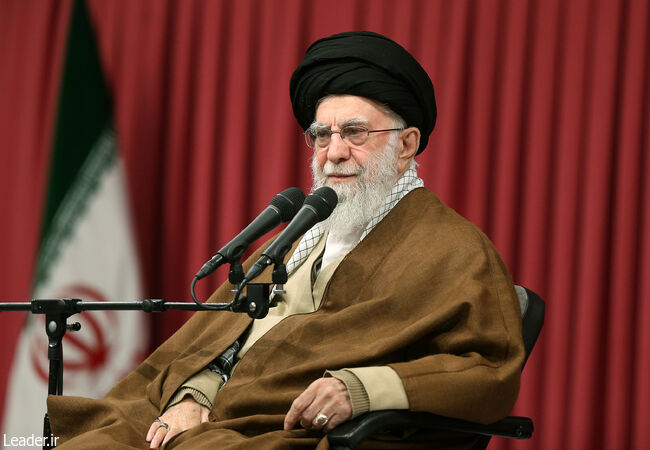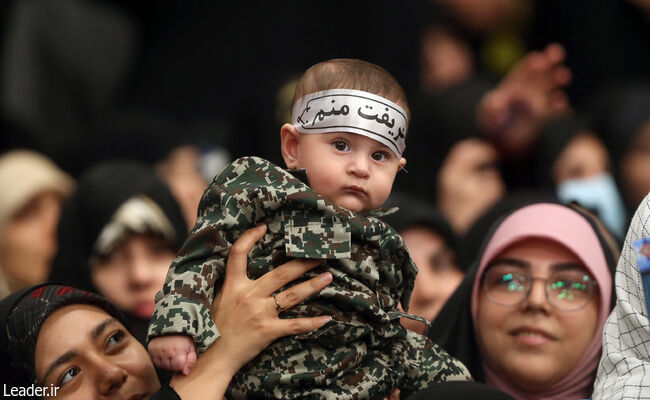Ayatollah Imam Khamenei also spoke about the ongoing crimes of the Zionist regime and the U.S. in the region, along with the support they receive from some parties. He said, "The Zionist regime imagines that, through Syria, it is preparing to encircle and eradicate the forces of Hezbollah, but it is Israel that will be eradicated."
At the beginning of his remarks, he congratulated the audience on the birthday of Lady Fatimah Zahra (s.a.), describing the gathering with women and girls as very vibrant and spirited. He referred to some key points raised by seven women during the session. These included protecting families in digital space, population growth, women's issues in art, and facilitating marriage. He said, "Officials in the Leader's Office and relevant institutions should seriously follow up on and consider the very valuable points raised by the women during this session."
The Leader mentioned certain aspects of Lady Fatimah Zahra (s.a.) that showed her as a wondrous phenomenon of creation. He said, "That a young woman, in terms of her spiritual and celestial identity, could reach such a station that, according to both Shia and Sunni narrations, her anger is aligned with God's anger and her satisfaction accords with God's satisfaction, is truly magnificent and extraordinary."
Some of the unparalleled qualities of Lady Fatimah (s.a.) that he mentioned were comforting the Prophet in times of hardship, standing alongside Amir al-Mu'minin in his struggles, dazzling the eyes of angels with her devotion in worship, delivering eloquent, articulate, and fiery sermons, and raising Imam Hasan, Imam Husayn (a.s.), and Lady Zaynab (s.a.). "In her childhood, youth, marriage, and conduct of life, she is the most eminent, beautiful, and eloquent role model for Muslim women." He added, "In her childhood, youth, marriage, and conduct of life, she is the most eminent, most beautiful, and most eloquent role model for Muslim women."
Ayatollah Khamenei spoke about various perspectives on the issue of women in the world, saying, "Capitalists and their political minions control most of the influential international media. They use dishonesty and lies and hide their criminal tendencies and impulses to corruption under the flimsy cloak of philosophical and humanitarian principles. In this way, they interfere and direct women's affairs in the global community and, in this way, realise their interests."
He mentioned that dishonesty and hypocrisy were the consistent methods of colonialists and Western capitalists. He gave the example of how they attracted women to factories to meet industrial demands for low-wage workers under the guise of women's freedom and independence.
Ayatollah Khamenei stated that the hidden aim behind the slogan of freeing enslaved Americans about two centuries ago was to move the enslaved people from the southern plantations to the factories in the north of the country. He added, "Even today, behind the feminist slogans and calls for women's freedom and rights lie anti-human and political objectives, some of which are evident now, while others will become clear in the future."
He emphasised that it was essential to explain Islam's charter on the subject of women to enhance the public’s understanding of its logic on this matter. He said that this logic must be established in society and implemented, noting that considerable progress has been made in this area since the Revolution.
The Leader described the concept of partnership (zawjiyyah) as the first important principle in Islam's charter on women. He said, "According to numerous Quranic verses, men and women are of the same essence; they are a pairing and complement each other."
Ayatollah Khamenei described the necessity of partnership and complementarity between men and women to form a third unit called the family. He said, "Accordingly, the formation of a family is a divine tradition of creation, and fortunately, in Iranian culture, a love for family is a significant sign of the nation's cultural strength and depth."
Another principle of Islam's charter on women the Leader mentioned was "the absence of any difference between men and women in spiritual progress, human excellence, and attaining a wholesome life (hayyat at tayyibah)." He said, "From the perspective of Islam, notwithstanding the physical differences between them, men and women possess limitless potential, intellectual and practical creativity, and other abilities. This enables women, like men, and in some cases obligates them, to play roles in various fields, including scientific, political, social, economic, international, cultural, and artistic endeavours." He did not consider the different roles of men and women in the family, from Islam's perspective, as evidence of one being superior to the other. He added, "Men and women have equal rights within the family; however, emotionally, Islam views the woman as a flower whose freshness and fragrance should be cherished and nurtured within the family."
The limitations governing interactions and relationships between men and women was another subject that is emphasised from the perspective of Islam. Concerning this, the Leader said that Islam places importance and gives consideration to issues such as hijab, chastity, and the gaze. He said, "The moral laxity seen in the West today is relatively new, as descriptions of European women in literary works from two or three centuries ago show that significant considerations regarding women had also existed in the West at that time."
He saw the "spiritual value of motherhood and pride in it" as another pillar of Islam's perspective on the issue of women. He pointed out, "Today, under the influence of the policies of capitalists, colonialists, and ill-wishers of independent societies- especially of ours- some people paint a negative image of motherhood. The incredible honour and value Islam places on the mother and the raising of a human being is shown in the various expressions it uses to describe motherhood, such as the tradition that says that paradise lies beneath the feet of mothers and those that strongly encourage love, service, and obedience to them."
After outlining some of the key principles of Islam's charter on women, Ayatollah Khamenei attributed the remarkable growth of faithful, knowledgeable, and active women in various fields following the Revolution to this elevated perspective. He said, "The role of women during the struggles and the victory of the Revolution was decisive, and the late Imam strongly opposed those who were against the participation of women in demonstrations…it was the entry of women into the field that brought along with them, their husbands and children into the movement; therefore, in a sense, it was women who brought about the victory of the Revolution.
The Leader mentioned other distinguished roles women have been playing after the victory of the Revolution. He cited their participation in the political and international arenas, their contributions during important events such as the Sacred Defence and the defence of the holy shrines, and other examples of the brilliant women's roles they have been playing so far. He said, "The Iranian woman has been able to safeguard the country's identity, culture, and authentic historical traditions with dignity, modesty, and chastity. As a result, she has not been affected by the consequences that many Western countries are experiencing, and, God willing, she will continue on this path in the future."
Ayatollah Khamenei highlighted the outstanding contributions of women in academic and research activities in universities and seminaries, noting, "Today, the number of women who have reached the level of ijtihad (Islamic jurisprudent) is not small. In fact, we believe that in many issues specific to women, where men may lack proper understanding or judgment, women should follow female mujtahids."
He mentioned that the growth in the number of religiously practising women as scientists, university professors, writers, poets, and artists was incomparable to the period before the Revolution. But added, "Of course, the enemy is not idle and is actively scheming; they quickly realised that defeating and subduing the Revolution through hard methods, such as war, bombings, ethnic divisions, and fomenting seditious forces, was not going to be successful. Therefore, they have turned to soft methods, including propaganda, temptations, and insincere slogans."
Ayatollah Khamenei said that using the claim of defending women to incite unrest in a country is an example of a false slogan of those who wish a country ill. He said, "Girls, women, professors, students, and the entire community of women should consider it their duty to remain vigilant against the subliminal messages, cunning methods, and soft warfare those who wish us ill use to deviate us from those values that concern women."
In the concluding part of his remarks, the Leader spoke about regional issues and noted, "Considering the actions taking place in Syria, the crimes of the Zionist regime and the U.S., and the support they received from others, the enemies have imagined that the Resistance was finished. However, they are gravely mistaken."
He declared that the spirits of Sayyid Hassan Nasrallah and Yahya Sinwar were alive, adding, "Their physical bodies may have departed, but martyrdom did not remove them from the realm of existence. Their spirit and thoughts remain, and their path continues."
Ayatollah Khamenei spoke about Gaza's resilience against daily attacks by the Zionists and the ongoing resistance in Lebanon, said, "The Zionist regime imagines it is preparing itself through Syria to encircle and eradicate Hezbollah in Lebanon, but the one that will be eradicated will be Israel."
The Leader reaffirmed Iran's steadfast support for Palestinian fighters and Hezbollah warriors, as well as the continuation of all possible assistance to them. He expressed the hope that one day, the fighters would see the malicious enemy trampled under their feet.
Before the Leader's remarks, six speakers active in the field of women and girls presented their views on topics including The Model of the Revolutionary Muslim Woman; Digital Space, Women, Family, and Children; Addressing Population Issues Through Strengthening the Family Unit; Empowering Female Artists and Enhancing Dramatic Works on Women's Issues, Facilitating Marriage and the Role of Intermediaries; and Reforming Educational Curricula for Female Students With a Focus on Strengthening Cultural Identity.
Ms Aida Sorour, the mother of two Lebanese martyrs, also spoke during the meeting on behalf of the women of the Axis of Resistance. She delivered remarks about the continuation and victory of the Resistance.



